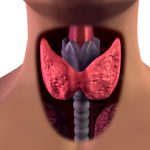 Grave’s disease increases the risk of hyperthyroidism and goiters. Grave’s disease is the most common cause of hyperthyroidism – a condition where the thyroid overproduces hormones that can have negative consequences on the body, such as speeding up the metabolism, sudden weight loss and an irregular heartbeat.
Grave’s disease increases the risk of hyperthyroidism and goiters. Grave’s disease is the most common cause of hyperthyroidism – a condition where the thyroid overproduces hormones that can have negative consequences on the body, such as speeding up the metabolism, sudden weight loss and an irregular heartbeat.
Grave’s disease is an autoimmune disease where the body’s immune system attacks itself causing it to malfunction. Aside from affecting the thyroid, Grave’s disease can have a negative impact on mental health and a person’s physical state.
Advertisement
Grave’s disease is named after Sir Robert Graves, who coined the condition back in 1835. The disease primarily affects the thyroid gland, which is responsible for the production and release of hormones.
Grave’s disease cause
 Grave’s disease is an autoimmune disease, which means the body’s immune system attacks itself. Like many autoimmune diseases there is no pin-pointed cause, but research suggests that a combination of genetic and environmental factors may play a role.
Grave’s disease is an autoimmune disease, which means the body’s immune system attacks itself. Like many autoimmune diseases there is no pin-pointed cause, but research suggests that a combination of genetic and environmental factors may play a role.
Another relationship seen in the development of Grave’s disease is smoking. Higher rates of Grave’s disease have been seen in smokers. Furthermore, family history of Grave’s disease also seems to play a role in the increased risk of the disease.
Grave’s disease symptoms
Due to the fact that Grave’s disease affects the thyroid, there can be a variety of symptoms experienced as the thyroid produces many essential hormones that help carry out bodily functions. Some common symptoms associates with Grave’s disease include:
 Increased sweating
Increased sweating- Weight loss
- Nervousness
- Hand tremors
- Anxiety
- Irregular or rapid heartbeat
- Enlargement of the thyroid gland (a goiter)
Grave’s disease also causes a distinct look of the eyes. Swelling and inflammation of eye tissue occurs in Grave’s disease, causing the eyes to look as if they are bulging. Eyes will become painful, red and watery, and people with the eye condition can become sensitive to light and even experience blurred vision.
Grave’s disease diagnosis and treatment
Many symptoms of Grave’s disease overlap with other diseases and conditions, making it difficult to initially diagnose. A blood test can be done to check levels of thyroid-stimulating hormone (TSH), which helps stimulate hormones. If levels of these hormones are elevated, it is a good indication of Grave’s disease.
 There are a variety of treatments for Grave’s disease, including the following:
There are a variety of treatments for Grave’s disease, including the following:
- Radioactive iodine therapy – Radioactive iodine is taken orally and slowly destroys overactive thyroid cells.
- Anti-thyroid medication – Medication to stop the thyroid from overproducing hormones.
- Beta blockers – Beta blockers work to block adrenaline and other similar components from having effect.
- Surgery – If other treatments fail, surgery may be required to remove the thyroid, and the patient will have to take hormones as they no longer have a thyroid to produce them. They may notice symptoms like excess weight gain.
Related Reading:
7 signs you have a thyroid problem
If you’re a female over the age of 35, your risk of a thyroid problem greatly increases. Roughly 15 million people suffer from thyroid disorders in silence, and estimates show nearly 30 million Americans have a thyroid disorder. Continue reading…
Advertisement
Facts about thyroid eye disease/disorders
There are many factors which can affect our eyesight, but we’ll bet the thyroid doesn’t come to mind first. If you already didn’t know, the thyroid can actually be responsible for eye diseases. The thyroid’s main responsibility is to regulate and produce hormones. When the thyroid is healthy and there are normal hormone levels in the blood, this is referred to as euthyroid. Continue reading…
Sources:
http://www.medicalnewstoday.com/articles
http://www.mayoclinic.org/diseases-conditions/hyperthyroidism/basics/definition
